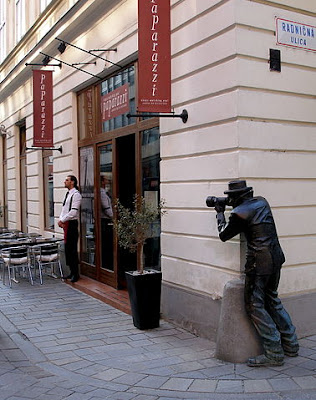 |
| Paparazzi restaurant and sculpture, Bratislava photo: Ing.Mgr. Jozef Kotulič |
"Regarding the text of the Odyssey I should merely say 'a straightforward and close translation into English prose, by T.E. Shaw.' There is no use in praising an unfinished work... and no use in explaining T. E Shaw. He is unhappily, a public character. And as the subject is you and your books there is no need for me to be drawn slant-wise across the scent."The first English edition of only 530 copies published the following year omitted the translators name, completely, but the first American edition in that same year was credited to T. E. Shaw but the name was followed by "(Lawrence of Arabia)" . Writing to Miss L. P. Black, on the 7th December, Shaw said:
"My Odyssey has been published in the States in a cheap edition (acknowledged authorship) and is said to be selling fairly. It will be amusing if I can collect some dollars off them. Prose justice!"In India, Shaw had thought that the problems of the press were behind him and on May 7th, 1928 wrote to George Bernard Shaw:
"Look how you are turned inside out daily in every paper, at the pleasure of any worm. God deliver me from the folly of ever returning to that game. You can only keep the press within the bounds by assuming always the offensive... by chucking to them, as it were, the less intimate details of your equipage. It's a tight-rope game, which only a very cool-headed person dare play. Not for me."But in September of that same year, his prayers were dashed. Harold Orlans, in T. E. Lawrence; Biography of a Broken Hero, 2003, McFarland & Company, Jefferson, N.C. eloquently explains what happened after a revolt broke out in Afghanistan:
"Lawrence expected to spend two years at Miranshah, but his stay was abruptly terminated by the inexpungeable inanities of tabloids and governments.
"... the London Evening News ran, under the headline LAWRENCE OF ARABIA'S SECRET MISSION, a preposterous story about Lawrence, "in disguise, spying on "Bolshevik agents in Amritsar. The Sunday Express reported that Lawrence, "concealed beneath a mocha stain and ... turban and robes" was on a secret mission in Afghanistan laying the ground for a treaty with Britain. ..."
 |
| Burton disguised as "Haji Abdullah" 1853 |
Early in the following year, the Daily Herald published a similar article and Malcolm Brown and Julia Cave: A Touch of Genius: The Life of T. E. Lawrence, Paragon House, 1989, New York, refer to this and add:
"As Labour Members of Parliament seethed and anti-imperialists burned Lawrence in effigy on Tower hill, the Foreign secretary of the Government of India overruled the better judgement of the Air Force and insisted that the subject of all this speculation should be got out of the sub-continent at once."Offered several options, Shaw, who never even went outside of the barbed wire confines of the fort at Miranshah on the Afghan border was content to return to England.
The paparazzi continued to arouse his ire after his return:
To Ernest Thurtle, April 1st, Cattewater, Plymouth:
"Please don't get the public feeling that I'm different from the crowd. By experience in many camps I have assured myself (so certainly that all the print in the world won't shake my conviction) that I'm a very normal sort of Anglo-Irishman. ... I feel like a Zoo beast without bars to defend me. There are all these absurd stories, with, in my fancy, people watching to confirm them, or make new ones. I know that is absurd: but you can write it down as a nervous affliction. The wearing a false reputation is as itchy a job as a false beard. Mine drives me crazy."
To H. Banbury April 18th, 1929:
"I daren't spend my little reserve of cash. At any moment press chatter may extrude me from the R.A.F. and I've got to live while trying to find a rumourproof job".
To H. A. Ford, April 18th. 1929:
...and as for choking off the Press - he will be my friend for life who finds how to do that. I do nothing - and they talk. I do something - and they talk. Now I am trying to accustom myself to the truth that probably I'll be talked over for the rest of my life: and after my life, too. There will be a volume of 'letters' after I die and probably some witty fellow will write another life of me. In fact there is a Frenchman trying to write a 'critical study' of me, now. They make me retch - and that's neither comfortable nor wholesome. I have thought of everything, I think: to join a newspaper (they do not eat each other, the dogs) - but what a remedy for the disease: to emigrate - but those colonies are as raw as wood alcohol: to commit some disgraceful crime and be put away:- but I have some people whose respect I struggle to keep. I don't know."Shaw's words, in this last letter are prophetic, and for my own part, I hope that my presentation of his character would not have made him retch as badly as those early reports. On Monday: Shaw's "personality adjustments" are revealed after his return to England. Have a news-free weekend.
John's Coydog Community page
No comments:
Post a Comment